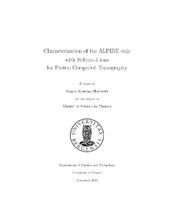Characterization of the ALPIDE chip with Helium-4 ions for Proton Computed Tomography
Master thesis
Permanent lenke
https://hdl.handle.net/1956/18748Utgivelsesdato
2018-12-06Metadata
Vis full innførselSamlinger
Sammendrag
Particle therapy has become an appealing therapeutic option for patients with various tumor types. The physical properties of charged particles allow for an improved dose distribution conformality compared to conventional photon-based radiotherapy. This advantage translates into a reduction of unwanted side effects from radiation treatment and in the long run will improve the patient’s quality of life. A team at the University of Bergen is developing a proton Computed Tomography (pCT) scanner prototype. This technology will primarily work as a supplement to particle therapy as it aims to enhance the accuracy of the pre-calculated dose plans applied during treatment. The pCT system is a Digital Tracking Calorimeter (DTC) consisting of multiple layers of the ALPIDE CMOS Monolithic Active Pixel Sensor with the aim of tracking protons and measure its energy. This thesis studies the ALPIDE chip towards its medical applications in the future DTC. It will describe the clusters created on the chip by helium ions and alpha particles with a focus on the parameters that affect the pixel size of the clusters. Results from an analysis of a helium microbeam indicate that the size of a cluster correlates with the position of the incoming particle on the pixel and hence, the interior location of the energy deposition. These clusters varied in size from 5 to 35 pixels when the beam scanned the chip in µm steps. Moreover, an experiment conducted during this project shows that the size of the clusters is dependent on the temperature of the chip and that the average size of the cluster gets larger with increasing temperature. In the end, the results obtained from an ALPIDE telescope irradiated with high energetic helium beams is described. This experiment shows that the clusters used in tracking increases in size at higher Linear Energy Transfer (LET) of the particles.
